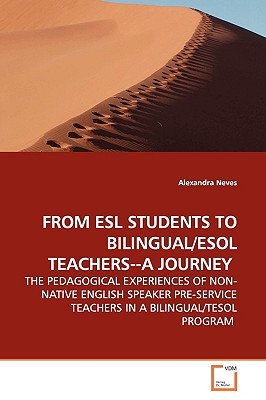
- We will send in 10–14 business days.
- Author: Alexandra Neves
- Publisher: VDM Verlag
- ISBN-10: 363913818X
- ISBN-13: 9783639138184
- Format: 15.2 x 22.9 x 1.2 cm, softcover
- Language: English
- SAVE -10% with code: EXTRA
From ESL Students to Bilingual/ESOL Teachers--A Journey (e-book) (used book) | bookbook.eu
Reviews
Description
The rapid change in the U.S. school population has fostered an ongoing debate over effective ways to create inclusive contexts for second language learning, as well as a growing concern for the educational needs of English language learners (ELLs). But what happens when former ELLs themselves enter programs to become bilingual or ESOL teachers? Are the same principles of inclusive learning and concern for students' educational needs taken into consideration in training this special group of teachers? These questions are discussed based on the findings of a study at a U.S. university. The study focuses on the pedagogical experiences of six non- native English speaker (NNES) bilingual/ESOL pre- service teachers, and examines how well the teacher education program at the university meets the educational needs of this group. Four emerging themes are presented, along with recommendations for teacher preparation programs.
EXTRA 10 % discount with code: EXTRA
The promotion ends in 16d.17:20:55
The discount code is valid when purchasing from 10 €. Discounts do not stack.
- Author: Alexandra Neves
- Publisher: VDM Verlag
- ISBN-10: 363913818X
- ISBN-13: 9783639138184
- Format: 15.2 x 22.9 x 1.2 cm, softcover
- Language: English English
The rapid change in the U.S. school population has fostered an ongoing debate over effective ways to create inclusive contexts for second language learning, as well as a growing concern for the educational needs of English language learners (ELLs). But what happens when former ELLs themselves enter programs to become bilingual or ESOL teachers? Are the same principles of inclusive learning and concern for students' educational needs taken into consideration in training this special group of teachers? These questions are discussed based on the findings of a study at a U.S. university. The study focuses on the pedagogical experiences of six non- native English speaker (NNES) bilingual/ESOL pre- service teachers, and examines how well the teacher education program at the university meets the educational needs of this group. Four emerging themes are presented, along with recommendations for teacher preparation programs.


Reviews